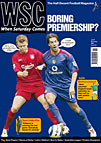 A Spanish football-themed thirtysomething comedy? Sounds like a formula for success, but as David Stubbs found out, no one was laughing
A Spanish football-themed thirtysomething comedy? Sounds like a formula for success, but as David Stubbs found out, no one was laughing
As a sometime film critic, I’m usually inclined to opt for foreign movies to review. This isn’t out of some cineaste snobbishness but simple logic. Whereas all kinds of Hollywood or, worse, UK-produced balderdash is liable to get a release in Britain, foreign movies that make it to the distribution stage here will generally have been through a rigorous sifting process, been nominated at one of the prestige European festivals, put up for the Palme D’Or and so forth. Hence, they’re more likely to be good.
God knows what process the Spanish movie Football Days went through in order to lap up on these shores. Evidently, it was borne here by mere virtue of featuring the word “football” in its title, for despite most evidence to the contrary, hope inexplicably springs about like Zebedee whenever the worlds of football and cinema collide. But as ever, it’s cinema that jumps the tackle here.
Football Days has two directors, screenwriter David Serrano and Mohammed Koshaggi – it’s no more a good sign when a film has two directors than when a team has two managers. The one and only laugh is that it’s billed as a comedy.
It concerns a bunch of thirtysomethings, brought together when Antonio, a psychotic, shell-suited buddy of theirs, is released from jail. He is bent on reforming and becoming a psychologist, but practically every two minutes he’s thrown into the sort of situation most of us come up against once a decade, which illustrates he’s still a nutter. Between them, he and his mates represent the gamut of male weakness – impetuous, sex-starved, humiliated in the workplace, henpecked. And so, they form a seven-a-side team in the hope of boosting their self-esteem. Trouble is, they’re useless. Unconvincingly useless, incidentally – the difficulties of reproducing top-class football on the screen you can understand, but this bunch of actors can’t even play bottom-class football plausibly, which is inexcusable. And so, they resort to cheating – and, while they don’t actually bring out a ladder on to the field of play for set pieces, in the manner of the cartoon Harlem Globetrotters, the practices they resort to are barely more subtle.
This is a comedy that sadly lends weight to the prejudice that Europeans are as well versed in comedy as they are in vegetarianism. Depressingly, you’re warned when humour is about to be embarked upon as a cheesy brass soundtrack strikes up, by a light oompah orchestra who sound like they’re bending and unbending at the knees as they play. It’s quaintly sex-obsessed business in the main, involving VD, blow jobs under restaurant tables and wanking. But it’s the sort of film that doesn’t understand that being in danger of getting caught masturbating by your mother isn’t funny in itself, but should serve as the premise for an imaginative comic scene. None follows.
The idea of the link between football and feelings of impotence and disappointment could have been wittily developed, but only by someone who should have been let near a camera in the first place. Suffice to say that Jonathan Woodgate produced more laughs in a split second in his Real Madrid debut than is afforded through the 109 long, long minutes of this chronically mirthless caper.
From WSC 225 November 2005. What was happening this month